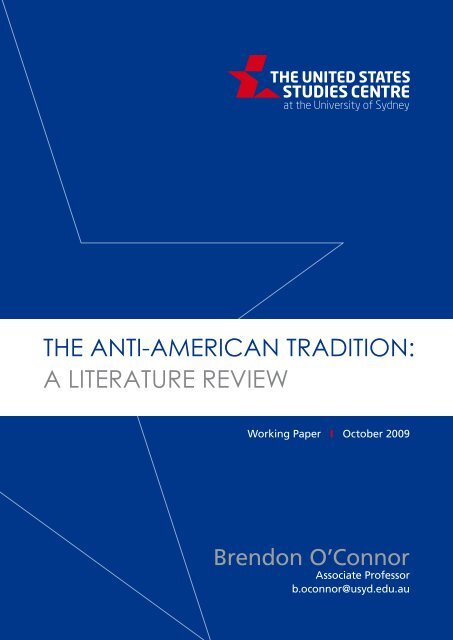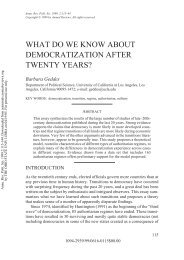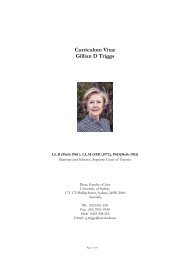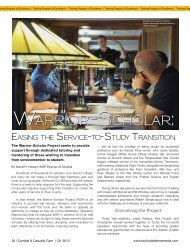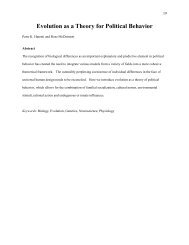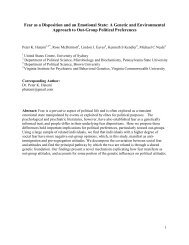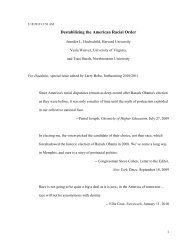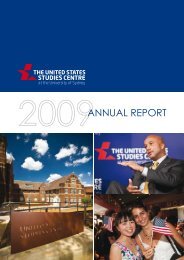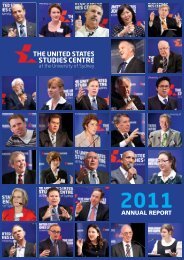the anti-american tradition: a literature review - United States ...
the anti-american tradition: a literature review - United States ...
the anti-american tradition: a literature review - United States ...
You also want an ePaper? Increase the reach of your titles
YUMPU automatically turns print PDFs into web optimized ePapers that Google loves.
The Anti-American Tradition:<br />
A <strong>literature</strong> <strong>review</strong><br />
Working Paper I October 2009<br />
Brendon O’Connor<br />
Associate Professor<br />
b.oconnor@usyd.edu.au
The AntiAmerican Tradition: A <strong>literature</strong> <strong>review</strong><br />
Brendon O’Connor, Associate Professor, US Studies Centre, University of Sydney.<br />
b.oconnor@usy.edu.au<br />
It is tempting to declare <strong>the</strong> term <strong>anti</strong>‐Americanism, like <strong>the</strong> term un‐American, a<br />
piece of pure political contrivance that defies any logical definition. After all, can<br />
anyone really be against a whole country The fact of <strong>the</strong> matter, however, is that<br />
political language is not always rooted in logic, and <strong>the</strong> term has entered into<br />
widespread use not only in <strong>the</strong> media, but also within <strong>the</strong> academy. Given <strong>the</strong>se<br />
facts, I would argue for a refining of <strong>the</strong> term, at least how it is used in academic<br />
debates. In general, <strong>anti</strong>‐Americanism is best understood as a prejudice with a<br />
long history that has built on itself to create what I have called an “<strong>anti</strong>‐American<br />
<strong>tradition</strong>” (O’Connor 2007 and 2006). The key period in <strong>the</strong> creation of this<br />
<strong>tradition</strong> was around <strong>the</strong> 1830s and 1840s, when a set of negative stereotypes<br />
and tropes were developed about Americans and America that have been<br />
recycled ever since. These stereotypes, outlined in <strong>the</strong> writings of European<br />
travellers like Frances Trollope, Charles Dickens and even de Tocqueville, mixed<br />
praise with harsh putdowns of American life, and were important because of<br />
<strong>the</strong>ir wide readership at a time when Europeans were developing strong and<br />
more lasting views about <strong>the</strong> New World.<br />
As I have stated, not all of this commentary was <strong>anti</strong>‐American. However, this<br />
raises <strong>the</strong> crucial question: how do you determine what merits <strong>the</strong> term “<strong>anti</strong>‐<br />
Americanism” and what does not To call all negative commentary about <strong>the</strong> US<br />
<strong>anti</strong>‐Americanism is obviously an exaggeration. Often <strong>the</strong> term is merely used as<br />
a political tactic to besmirch one’s opponents. This is not always that successful,<br />
as <strong>the</strong>re are frequently counterclaims of Americanophilia. While it is widely<br />
agreed that <strong>the</strong> terrorist attacks on <strong>the</strong> World Trade Center were unambiguous<br />
instances of violent <strong>anti</strong>‐Americanism, whe<strong>the</strong>r much of <strong>the</strong> broader <strong>anti</strong>pathy<br />
toward America is fairly labelled <strong>anti</strong>‐Americanism is frequently contested, not<br />
least because what one person will call <strong>anti</strong>‐Americanism will be defended by<br />
ano<strong>the</strong>r as reasonable criticism. In fact, it is a rare person who openly<br />
acknowledges <strong>the</strong>ir <strong>anti</strong>‐Americanism, and like most political debates, <strong>the</strong><br />
tendency to caricature one’s opponents is commonplace.<br />
One side of this debate about <strong>anti</strong>‐Americanism overuses and abuses <strong>the</strong> term as<br />
a blanket term to describe any criticism of <strong>the</strong> US. 1 Conversely those on <strong>the</strong> o<strong>the</strong>r<br />
side of <strong>the</strong> fence deny that <strong>the</strong>ir opinions are <strong>anti</strong>‐American at all, despite <strong>the</strong> fact<br />
that similar comments made about almost any o<strong>the</strong>r people or nation would be<br />
quickly called racism or prejudice. This polarized debate, although disappointing,<br />
is not particularly surprising; however, what is curious is that scholars have<br />
done little to help clarify and elevate discussions on <strong>anti</strong>‐Americanism – <strong>the</strong>y<br />
should be playing an important role in negotiating a way through such<br />
politicized discourses.<br />
It is difficult to determine whe<strong>the</strong>r <strong>the</strong> great rise in negative sentiment toward<br />
America during <strong>the</strong> Bush administration denotes true <strong>anti</strong>‐Americanism;<br />
perhaps this is because ra<strong>the</strong>r blunt instruments are being used to measure it.<br />
1
The Pew Global Attitudes Project survey is <strong>the</strong> most influential ongoing survey in<br />
<strong>the</strong> world concerning attitudes toward America, with <strong>the</strong> analysis of <strong>the</strong> Pew<br />
Center having a profound impact on <strong>anti</strong>‐Americanism commentary. In <strong>the</strong><br />
survey, respondents are asked <strong>the</strong>ir attitude toward America by choosing<br />
options from <strong>the</strong> following statement: “Please tell me if you have a very<br />
favorable, somewhat favorable, somewhat unfavorable or very unfavorable<br />
opinion of <strong>the</strong> <strong>United</strong> <strong>States</strong>”. Respondents are asked to judge an entire nation in<br />
<strong>the</strong> same manner <strong>the</strong>y would an individual political leader or party, with <strong>the</strong><br />
assumption being that <strong>the</strong> US is a monolithic entity. However, while this survey<br />
certainly provides solid evidence of America’s unpopularity in nearly all <strong>the</strong><br />
countries where it is conducted, to be truly useful to <strong>the</strong> ongoing study of <strong>anti</strong>‐<br />
Americanism, such surveys need to be prefaced by a more precise definition of<br />
<strong>the</strong> term; at present <strong>the</strong> poll data is too often presumed to explain what is clearly<br />
a more complicated question.<br />
To establish what should be fairly called <strong>anti</strong>‐Americanism requires us to craft a<br />
definition that can be defended. Let us begin with <strong>the</strong> conjoined words<br />
<strong>the</strong>mselves: to establish an opinion as “<strong>anti</strong>” – against – is relatively<br />
straightforward, although <strong>the</strong> extent of opposition required is much debated.<br />
What is connoted by being opposed to America is even more problematic. One<br />
can ask: Why <strong>the</strong> “ism” at <strong>the</strong> end Can <strong>anti</strong>‐Americanism really be seen as an<br />
ideology, or is <strong>the</strong> “ism” suggestive of a prejudiced view against a grouping of<br />
people, similar to racism or sexism Given <strong>the</strong>se dilemmas, <strong>the</strong> most challenging<br />
of which is summarising how people feel about <strong>the</strong> vast and varied nature of<br />
American activities and influences, one response has been to suggest that <strong>anti</strong>‐<br />
Americanism is not so much a reaction to what America “does”, but more a<br />
reaction to what America apparently “is” or what it symbolises (Markovits 2007;<br />
Ceaser 2004). While this approach has a certain neatness to it, and while it<br />
captures a particular <strong>anti</strong>‐American mindset, it too readily overlooks <strong>the</strong><br />
undeniable reality that <strong>anti</strong>pathy towards America has grown sharply in recent<br />
years in response to <strong>the</strong> Bush administration’s policies, and some of this<br />
<strong>anti</strong>pathy is sensibly called <strong>anti</strong>‐Americanism. Given <strong>the</strong> lack of uniformity of<br />
<strong>anti</strong>‐American opinion and <strong>the</strong> multiple sources of dislike of America, some<br />
scholars prefer instead to talk in <strong>the</strong> plural of “<strong>anti</strong>‐Americanisms” (Katzenstein<br />
and Keohane 2007; Singh, 2006). Then <strong>the</strong>re are those who are willing to<br />
acknowledge that <strong>anti</strong>‐Americanism does indeed exist, but feel unable to offer a<br />
clear definition, resorting instead to <strong>the</strong> line uttered by Justice Potter Stewart in<br />
his struggle to precisely define pornography: “I know it when I see it” (Markovits,<br />
2007; Singh, 2006; Hitchens 2002). 2 Nei<strong>the</strong>r response, however, is satisfactory:<br />
<strong>the</strong> blatant subjectivity of <strong>the</strong> Potter Stewart position makes it open to abuse,<br />
while to talk of <strong>anti</strong>‐Americanisms in <strong>the</strong> plural often casts <strong>the</strong> net too wide, and<br />
<strong>the</strong>refore fails to establish a difference between <strong>anti</strong>‐Americanism and what<br />
would better be called criticism. Like Katzenstein and Keohane, I see <strong>anti</strong>‐<br />
Americanism as more than just criticism of particular US government policies,<br />
and would agree with <strong>the</strong>m that “bias is <strong>the</strong> most fundamental form of <strong>anti</strong>‐<br />
Americanism, which can be seen as a form of prejudice” (Katzenstein and<br />
Keohane 2007, 12, 274). Without a clear definition, finger pointing and rhetoric<br />
will continue to dominate debates about <strong>anti</strong>‐Americanism.<br />
2
I have attempted to address this issue by crafting a more precise definition. From<br />
<strong>the</strong> broad and varied commentary on <strong>the</strong> topic, I have extracted five<br />
understandings of how <strong>the</strong> term is used. Simply stated, <strong>the</strong>se competing<br />
conceptions can be characterized as <strong>anti</strong>‐Americanism firstly as one side of a<br />
dichotomy, secondly as a tendency, thirdly as a pathology, fourthly as a prejudice<br />
and fifthly as an ideology. If in offering <strong>the</strong>se definitions I can successfully<br />
convince readers that <strong>the</strong>re are sensible ways in which <strong>anti</strong>‐Americanism can be<br />
differentiated from criticism, I feel that I will have made an important advance in<br />
<strong>the</strong> ra<strong>the</strong>r circular debates on what constitutes <strong>anti</strong>‐Americanism.<br />
1. AntiAmericanism as one half of a dichotomy<br />
As one half of a dichotomy, <strong>anti</strong>‐Americanism is understood in a binary or<br />
oppositional fashion, where people, groups or nations are seen simply as ei<strong>the</strong>r<br />
pro‐ or <strong>anti</strong>‐American. Thus, <strong>anti</strong>‐Americanism is defined simply as <strong>the</strong> views<br />
and actions of those deemed not to be pro‐American. At its worst this is <strong>the</strong> “for<br />
us or against us” view of <strong>the</strong> Bush administration, and <strong>the</strong> “which side are you<br />
on” demand of tribal politics. It also represents <strong>the</strong> worldview of tabloid<br />
journalism, where, for <strong>the</strong> sake of speed and simplicity, politics is constantly<br />
polarized. This approach overstates <strong>the</strong> degree of <strong>anti</strong>‐Americanism, and<br />
simplistically labels any critic of America an <strong>anti</strong>‐American, enabling an<br />
instrumental use of <strong>the</strong> term to discipline dissent.<br />
2. AntiAmericanism as a tendency<br />
A little less crude, but still straightforward, this term sees <strong>anti</strong>‐Americanism as a<br />
tendency that slides across a pro‐ and <strong>anti</strong>‐American scale depending on <strong>the</strong><br />
issue, <strong>the</strong> time or <strong>the</strong> place. Opinion pollsters generally adopt this understanding<br />
with <strong>the</strong>ir questionnaires that aim to measure negative and positive perceptions<br />
of America. Seeing <strong>anti</strong>‐Americanism as a tendency is often very imprecise.<br />
None<strong>the</strong>less, because of <strong>the</strong> allure of polling data, this understanding is likely to<br />
be <strong>the</strong> predominant way of viewing <strong>anti</strong>‐Americanism into <strong>the</strong> foreseeable<br />
future.<br />
3. AntiAmericanism as a pathology<br />
This understanding sees <strong>anti</strong>‐Americanism as akin to an allergic reaction to all<br />
things American (Toinet 1990; Zeldin 1990). It is probably <strong>the</strong> most precise and<br />
literal way of defining <strong>anti</strong>‐Americanism, but if adopted, <strong>the</strong> outcome would be<br />
such a limited application of <strong>the</strong> term that almost no one’s actions or thoughts<br />
(apart from bin Laden’s and o<strong>the</strong>r extremists) could correctly be labelled <strong>anti</strong>‐<br />
Americanism. This definition thus takes <strong>the</strong> term too far from its common usage,<br />
and has limited utility.<br />
4. AntiAmericanism as a prejudice<br />
The fourth conception of <strong>anti</strong>‐Americanism is as a prejudice. This understanding<br />
of <strong>anti</strong>‐Americanism is underutilized because of a prevailing orthodoxy that sees<br />
prejudice as only associated with historically dispossessed or disadvantaged<br />
peoples. However, I believe that <strong>anti</strong>‐Americanism is most usefully understood<br />
as a prejudice. Under this definition, <strong>anti</strong>‐American opinion or action would have<br />
to prejudge, be clearly one‐sided or biased, or be based on an undifferentiated<br />
view of America and Americans. Where this <strong>anti</strong>‐Americanism goes beyond what<br />
3
some have called mere prejudice, and is better described as ideological, is<br />
interesting, albeit extremely complicated to consider.<br />
5 AntiAmericanism as an ideology<br />
A fifth conception of <strong>anti</strong>‐Americanism is as an ideology. 3 This is a far more<br />
complex and speculative way of defining <strong>anti</strong>‐Americanism, complicated not<br />
least by <strong>the</strong> contested and untidy nature of <strong>the</strong> term “ideology” itself. Freeden<br />
contends that to qualify as an ideology, a belief system needs to have discernable<br />
views on important political questions and concepts such as freedom, democracy<br />
and equality. Anti‐Americanism would seem to generally fall short of this<br />
standard (Freeden 1996, 2003a, 2003b). Anti‐Americanism does provide a<br />
public policy position, but it is a ra<strong>the</strong>r limited argument against what is seen to<br />
represent American culture, ideas and policies. Where <strong>anti</strong>‐Americanism can be<br />
seen clearly as an ideology is in <strong>the</strong> hands of ideologues such as Fidel Castro,<br />
with a number of authors remarking that <strong>anti</strong>‐Americanism has overtaken<br />
communism as Castro’s dominant guiding ideology (Falcoff 2004, 197). Anti‐<br />
Americanism in Europe or Australia is far less coherent, and as a result far less<br />
ideological in character. Those who see America as symbolizing hyper‐capitalism<br />
have criticisms that are ideological in nature, but <strong>the</strong>se critiques are often more<br />
Marxist or <strong>anti</strong>‐imperialist than <strong>anti</strong>‐American. Much more research is required<br />
before we can reach a sound understanding of <strong>the</strong> ideological nature of <strong>anti</strong>‐<br />
Americanism.<br />
From <strong>the</strong>se definitions, I have arrived at <strong>the</strong> conclusion that <strong>anti</strong>‐Americanism is<br />
best understood as a prejudice. This prejudice is most instructively understood<br />
by seeing <strong>anti</strong>‐Americanism as a <strong>tradition</strong> that began to take shape in <strong>the</strong> early<br />
nineteenth century when a set of stereotypes emerged that have been recycled<br />
and developed upon ever since. These negative opinions were principally<br />
focused on <strong>the</strong> alleged backwardness and dullness of both America’s culture and<br />
its people. In <strong>the</strong> early 1830s in Europe, a common view developed that America<br />
was, to use <strong>the</strong> phrase so well employed by Andrei Markovits in his book, an<br />
“uncouth nation” (Markovits 2007). This <strong>anti</strong>‐American <strong>tradition</strong> has ebbed and<br />
flowed in its usage and prominence ever since, being more obvious and visible in<br />
some periods than in o<strong>the</strong>rs. Like <strong>the</strong> foreign policy <strong>tradition</strong>s, this <strong>tradition</strong><br />
jostles with o<strong>the</strong>rs (such as American exceptionalism) for public attention.<br />
Certainly presidents animate <strong>the</strong> <strong>anti</strong>‐American <strong>tradition</strong> in a unique way: note<br />
<strong>the</strong> remarkable difference between how George W. Bush and Barack Obama are<br />
viewed by <strong>the</strong> European populaces. The American president is seen as<br />
symbolising his nation in a way equalled by few leaders in modern democracies.<br />
It is fascinating how so many peoples around <strong>the</strong> world are happy to dismiss<br />
<strong>the</strong>ir own politicians as unrepresentative chameleons, while insisting that <strong>the</strong><br />
American president is truly representative of America and Americans. This view<br />
reflects <strong>the</strong> heavy emphasis on personal biography in American politics and <strong>the</strong><br />
tendency of presidential candidates to link <strong>the</strong>ir personal narrative with national<br />
mythology. It also reflects <strong>the</strong> appeal of stereotypes when making sense of any<br />
country or group.<br />
America has always been a source of significant European fantasy and projection.<br />
It has been claimed that Europeans did not discover America, ra<strong>the</strong>r that <strong>the</strong>y<br />
4
invented it. It is hard to deny that mythology has played an especially important<br />
role in American society and politics. The European myths regarding <strong>the</strong> first<br />
explorers and pilgrims were largely positive, with America portrayed as <strong>the</strong><br />
Golden Land, <strong>the</strong> chosen land and even <strong>the</strong> New Jerusalem (Bradbury 1995).<br />
However, <strong>anti</strong>‐American attitudes can be found in commentary on <strong>the</strong> early<br />
American colonies. In its earliest forms, <strong>the</strong> belittling of America (<strong>the</strong> continent<br />
as much as <strong>the</strong> British American colonies) often focused on <strong>the</strong> so‐called<br />
degenerate New World environment and its supposedly inferior animals. The<br />
humid New World climate was often commented on as making people incapable<br />
of serious thought or human achievement. This ecological scaremongering about<br />
<strong>the</strong> US as a barren and deformed environment has been explored by Andrei<br />
Markovits (2007), Philippe Roger (2005), James Ceaser (1997), and most<br />
comprehensively Antonello Gerbi (1973). Ceaser’s work highlights <strong>the</strong><br />
prevalence of <strong>the</strong> degeneracy <strong>the</strong>ory in Europe and how seriously Jefferson and<br />
o<strong>the</strong>r Americans attempted to rebuff it.<br />
Once <strong>the</strong>se early environmental dismissals of America waned, <strong>the</strong> <strong>United</strong> <strong>States</strong><br />
of America was principally critiqued as a cultural wasteland (i.e. as Europe’s<br />
cultural inferior). This denunciation has been <strong>the</strong> most central and lasting strand<br />
of <strong>the</strong> <strong>anti</strong>‐American <strong>tradition</strong>, and has been illustrated by <strong>the</strong> most common<br />
responses to George W. Bush around <strong>the</strong> world. There is usually an underlying<br />
cultural element to negative responses to Bush, with a large percentage of <strong>the</strong><br />
world’s population seeing him as uncultured, uncouth and stupid; such mockery<br />
draws on this long <strong>anti</strong>‐American <strong>tradition</strong> and its firm cultural foundations. This<br />
subject has been best explored in detail by Markovits who focuses on reactions<br />
to what America supposedly is as opposed to reactions to what America does. His<br />
research points to a common want or need to see America as inferior within<br />
Europe. For example he suggests that <strong>the</strong> American movie Bowling for<br />
Columbine, released in 2002, was enormously popular in Europe not because of<br />
any particular interest Europeans had in joining American gun control<br />
campaigns, but because <strong>the</strong> movie allowed <strong>the</strong>m to look down <strong>the</strong>ir noses at<br />
Americans. Markovits subst<strong>anti</strong>ates his views with his survey of 1,500 articles<br />
selected from a range of European newspapers, covering <strong>the</strong> decade between<br />
1992 and 2002. Deliberately avoiding <strong>the</strong> political pages, he analyzes largely<br />
cultural issues to expose <strong>the</strong> underbelly of <strong>anti</strong>‐Americanism. What he finds are<br />
regularly gratuitous and snide remarks about America and Americans in articles<br />
that range from <strong>the</strong> world of accounting through to sports. Markovits shows <strong>the</strong><br />
historical continuity of <strong>the</strong>se <strong>anti</strong>‐American tropes, drawing particularly on<br />
examples from German history to rightly conclude that “<strong>the</strong> <strong>the</strong>mes and<br />
structures of <strong>anti</strong>‐Americanism are anything but new” (Markovits 2007: 38).<br />
Scholars such as David Kennedy (2007), Tony Judt (1992) and Henry Pelling<br />
(1957) all add a complexity to our understanding of <strong>the</strong> <strong>anti</strong>‐American <strong>tradition</strong>.<br />
Pelling is particularly good at highlighting how <strong>the</strong> US swings from being seen as<br />
a progressive vision of <strong>the</strong> future to being seen as a malevolent force depending<br />
on <strong>the</strong> time and place visited, or <strong>the</strong> politics of <strong>the</strong> commentator. Apposite in this<br />
regard is Pelling’s summary of Samuel Gompers’ visit to Europe: “Hope and<br />
disillusion will long continue to colour <strong>the</strong> European view of America, as <strong>the</strong>y did<br />
when Gompers crossed <strong>the</strong> Atl<strong>anti</strong>c in 1909 to discover that people in Western<br />
5
Europe looked at his country as if in one of two distorting mirrors, ei<strong>the</strong>r convex<br />
or concave” (Pelling 1957: 161). Disappointment and even disillusionment with<br />
America has long been <strong>the</strong> flip side of high hopes and possibly unrealistic<br />
expectations about America. Tony Judt, with his characteristic skill and insight,<br />
takes us into <strong>the</strong> world of French <strong>anti</strong>‐American attitudes in <strong>the</strong> 1920s and<br />
1930s. He argues that, like earlier nineteenth‐century criticism, <strong>anti</strong>‐<br />
Americanism in <strong>the</strong> 1930s was largely conservative in its origins, with strong<br />
rom<strong>anti</strong>c overtones. American society was criticised for becoming something<br />
akin to Chaplin’s Modern Times writ large, with its materialism and industrialism<br />
seen as a real threat to <strong>the</strong> beauty and variety of Western culture (Judt 1992:<br />
190‐1). Fur<strong>the</strong>rmore, for most of <strong>the</strong>se detractors, Europe was and always would<br />
be <strong>the</strong> soul of Western civilization; however, for some <strong>anti</strong>‐Americans, <strong>the</strong> Orient<br />
was rom<strong>anti</strong>cised as <strong>the</strong> <strong>anti</strong>dote to <strong>the</strong> American way. Important criticisms of<br />
American materialism, corporatization, and conformity that emerged in this<br />
period were pushed to <strong>the</strong> sidelines after 1945 with <strong>the</strong> discrediting of <strong>the</strong><br />
European right and <strong>the</strong> rise of <strong>the</strong> communist threat. Fur<strong>the</strong>rmore, in <strong>the</strong> 1930s<br />
a particular strand of <strong>anti</strong>‐Americanism had become an extension of <strong>anti</strong>‐<br />
Semitism. In <strong>the</strong> minds of certain critics, Jews were associated with rootless<br />
modernity and capitalism, with <strong>the</strong> worst outcome of <strong>the</strong>se forces being America.<br />
Summing up this tendency, Judt translates French right‐wing columnist Robert<br />
Brasillach’s answer to <strong>the</strong> question of what separated France from America. “The<br />
answer is threefold: its hypocrisy (a frequent charge), its dollars, and<br />
international Jewry.” Judt goes on to note that “[a]s <strong>the</strong> last bastion of Jewish<br />
power in <strong>the</strong> world, <strong>the</strong> <strong>United</strong> <strong>States</strong> was <strong>the</strong> enemy of revolutionaries and<br />
reactionaries, <strong>anti</strong>‐modernists and socialists alike” (Judt 1992: 194). This list of<br />
enemies points to <strong>the</strong> plasticity of America as a target for criticism, blame and<br />
grievance.<br />
The explicit study of Cold War <strong>anti</strong>‐Americanism is strangely underdone. It could<br />
be argued that <strong>the</strong> Cold War ushered in ideological <strong>anti</strong>‐Americanism as <strong>the</strong> main<br />
variant of <strong>the</strong> <strong>tradition</strong>, underpinned by socialist and communist rhetoric about<br />
America as a ruthless, imperial nation. Whe<strong>the</strong>r this commentary is best thought<br />
of as <strong>anti</strong>‐American or as criticism has never been explored in a scholarly<br />
manner. The most significant author who has given attention to writing on <strong>anti</strong>‐<br />
Americanism during <strong>the</strong> Cold War period is Paul Hollander, whose book Anti<br />
Americanism (1992/1995) is <strong>the</strong> most notable work on <strong>the</strong> subject. Hollander is<br />
a staunch <strong>anti</strong>‐communist, who escaped from his native Hungary in 1956.<br />
However, he has surprisingly little to say about Soviet <strong>anti</strong>‐American rhetoric –<br />
perhaps <strong>the</strong> <strong>anti</strong>pathy between <strong>the</strong> nations was seen as so obvious that he did<br />
not regard it as necessary to study in <strong>the</strong> context of <strong>anti</strong>‐Americanism. Instead,<br />
most of his writing deals with American <strong>anti</strong>‐Americanism and <strong>the</strong><br />
condemnation of <strong>the</strong> US by Third World and European intellectuals. Hollander<br />
(1995) combines <strong>the</strong>se <strong>the</strong>mes in his work that looked at Americans (and some<br />
Europeans) who travelled to Nicaragua during <strong>the</strong> 1980s to condemn US<br />
government policies In this work it, Hollander deals with a group of “political<br />
pilgrims” who were possibly unfairly dubbed by Jean Kirkpatrick <strong>the</strong> “blame<br />
America first” crowd. Meanwhile, Richard Kuisel looks at <strong>the</strong> issue by analysing a<br />
leader’s point of view, examining whe<strong>the</strong>r de Gaulle is rightly seen as <strong>anti</strong>‐<br />
American. In a thoughtful and revealing manner, Kuisel argues that de Gaulle did<br />
6
not have a “visceral dislike” of Americans or <strong>the</strong>ir institutions; ra<strong>the</strong>r, his main<br />
gripe was with American hegemony and mass Americanization. De Gaulle<br />
seemed to share with many of his countrymen a stereotypical view that <strong>the</strong><br />
<strong>United</strong> <strong>States</strong> was “soulless, materialist and ahistorical” (Kuisel 1992: 31), and<br />
his response to <strong>the</strong> American challenge was to streng<strong>the</strong>n French independence<br />
and self‐reliance. It has been argued that <strong>the</strong> lesson France took from <strong>the</strong> 1956<br />
Suez Crisis was never again to be dependent on <strong>the</strong> Americans, whereas <strong>the</strong><br />
lesson that Britain took was never to be on <strong>the</strong> opposite side from <strong>the</strong> US in an<br />
international conflict. Given <strong>the</strong>se attitudes, it is interesting that Kuisel concludes<br />
that “de Gaulle’s affirmation of nation pride served in <strong>the</strong> long run to dampen<br />
French combativeness towards <strong>the</strong> <strong>United</strong> <strong>States</strong> and subdue <strong>the</strong> country’s<br />
assertiveness in world affairs.” Fur<strong>the</strong>r, this re‐building of French pride and de<br />
Gaulle’s promotion of economic growth and technological advancement<br />
increased “domestic Americanisation” in France (as evidence by <strong>the</strong> rise in<br />
“American‐style consumption” and <strong>the</strong> “proliferation” of American products)<br />
(Kuisel 1992: 31). Henry Fairlie suggests that: “It is <strong>the</strong> impact of<br />
Americanization that is at <strong>the</strong> core of <strong>anti</strong>‐Americanism” (Fairlie 1975: 39). I<br />
would agree that this concern remains constant and ongoing, while concerns<br />
about American foreign policy actions rise and fall depending on <strong>the</strong><br />
circumstances or <strong>the</strong> president of <strong>the</strong> day. Fur<strong>the</strong>r, a fear of Americanization<br />
creates an underlying nervous anxiety that explains some of <strong>the</strong> emotionality,<br />
and at times highly personalised ridicule, in non‐American responses to US<br />
politicians like George W. Bush or Ronald Reagan. Often underlying both <strong>the</strong><br />
response to Bush and America is a particular dismay that success has been<br />
achieved by such a seemingly inferior nation, allegedly populated by an<br />
unsophisticated people.<br />
This brings us back to Walter Russell Mead’s aim in Special Providence: to explain<br />
<strong>the</strong> “paradox that <strong>the</strong> foreign policy <strong>tradition</strong>s, practices, and institutions of <strong>the</strong><br />
world’s most successful country encounter a near‐universal yet strangely<br />
incoherent contempt” (Mead 2002: 34). The success of this underrated “Mr<br />
Magoo” of a nation has long been <strong>the</strong> source of considerable displeasure and<br />
bemusement. The success of <strong>the</strong> “ugly American” is <strong>the</strong> <strong>the</strong>me of a novel better<br />
known for its title than <strong>the</strong> hero of <strong>the</strong> story. The Ugly American, co‐authored by<br />
William Lederer and Eugene Burdick, ends with an interesting “factual epilogue”.<br />
Written at <strong>the</strong> end of <strong>the</strong> 1950s, it highlights <strong>the</strong> lack of foreign language<br />
proficiency in <strong>the</strong> American Foreign Service. They argue:<br />
It would seem a simple fact of life that ambassadors to at least <strong>the</strong> major<br />
nations should speak those languages. Yet in France, Italy, Germany, Belgium,<br />
<strong>the</strong> Ne<strong>the</strong>rlands, Norway, and Turkey, our ambassadors cannot speak <strong>the</strong><br />
native tongue ... In <strong>the</strong> whole of <strong>the</strong> Arabic world – nine nations – only two<br />
ambassadors have language qualifications. In Japan, Korea, Burma, Thailand,<br />
Vietnam, Indonesia, and elsewhere, our ambassadors must speak and be<br />
spoken to through interpreters. In <strong>the</strong> entire Communist world, only our<br />
ambassadors to Moscow can speak <strong>the</strong> native language (Lederer and Burdick<br />
1959: 274‐275). 4<br />
7
As for <strong>the</strong> regular staff:<br />
“fifty percent of <strong>the</strong> entire Foreign Service officer corps do not have a speaking<br />
knowledge of any foreign language. Seventy percent of <strong>the</strong> new men coming<br />
in <strong>the</strong> Foreign Service are in <strong>the</strong> same state” (Quoting Reston in Lederer and<br />
Burdick 1959: 275).<br />
They go on to argue that political and financial connections are used too often in<br />
deciding ambassadorial posts, that <strong>the</strong> State Department is lamentably inept at<br />
attracting <strong>the</strong> best and <strong>the</strong> brightest, and that regular Foreign Service employees<br />
as well as ambassadors seriously lack foreign language skills. Many of <strong>the</strong>se<br />
claims may sound familiar – in more recent times <strong>the</strong>y have been made about <strong>the</strong><br />
Foreign Service under <strong>the</strong> presidency of George W. Bush. Over 30 percent of<br />
Bush’s ambassadorial appointments were political appointees – a record in <strong>the</strong><br />
modern diplomatic era. The knowledge of Arabic in <strong>the</strong> key government<br />
departments was woefully inadequate as books like <strong>the</strong> Imperial life in <strong>the</strong><br />
Emerald City (2007) and The New Rome (2008) starkly point out. Cullen Murphy<br />
in The New Rome writes: “Three years before 9/11 a former CIA officer with<br />
extensive experience in <strong>the</strong> Middle East recalled that not one of <strong>the</strong> Iran desk<br />
chiefs who served during his eight years of working on Iran could speak or read<br />
Persian. Not one of <strong>the</strong> Near East division chiefs could read or speak Arabic,<br />
Persian, or Turkish” (Murphy 2008: 143). Possibly more worrying is <strong>the</strong> number<br />
of senior foreign policy decision‐makers who do not understand <strong>the</strong> differences<br />
between <strong>the</strong> Sunni and Shia – a fact that was embarrassingly reported by <strong>the</strong><br />
New York Times in 2006 (Stein 2006). John McCain, a self‐proclaimed expert on<br />
foreign affairs, confused <strong>the</strong> distinction between <strong>the</strong> Shia and Sunni on a number<br />
of occasions during <strong>the</strong> 2008 presidential campaign (Thomas 2008).<br />
This apparent ignorance is <strong>the</strong> source of considerable disdain towards <strong>the</strong> <strong>United</strong><br />
<strong>States</strong>; it feeds into <strong>anti</strong>‐American prejudices about <strong>the</strong> US as an arrogant and<br />
self‐absorbed society. Fur<strong>the</strong>r, America’s supposed ignorance is one of a number<br />
of concerns about <strong>the</strong> US that help to explain why <strong>the</strong> terrorist attacks of<br />
September 11, 2001 were not greeted with <strong>the</strong> universal condemnation that one<br />
might have expected if a similar event took place in ano<strong>the</strong>r Western country.<br />
The response to 9/11 and <strong>the</strong> difference between how Americans see <strong>the</strong>mselves<br />
and how <strong>the</strong> world views <strong>the</strong>m is thoughtfully explored by Richard Crockatt in<br />
America Embattled where he explores <strong>the</strong> causes and consequences of <strong>anti</strong>‐<br />
Americanism. Starting with <strong>the</strong> British response to 9/11, he writes: “Once <strong>the</strong><br />
initial shock of <strong>the</strong> September 11 attacks had passed, wrote Mary Beard, a ‘more<br />
hard‐headed reaction set in,’ which included <strong>the</strong> feeling that ‘however tactfully<br />
you dress it up, <strong>the</strong> <strong>United</strong> <strong>States</strong> had it coming’” (Crockatt 2003: 39). Not<br />
surprisingly, Beard’s words sparked considerable controversy and many angry<br />
letters to <strong>the</strong> London Review of Books, <strong>the</strong> original publisher of Beard’s remarks.<br />
Much debated was <strong>the</strong> link between a dislike of American foreign policies and<br />
8
laming <strong>the</strong> American people. Osama bin Laden has taken this to extremes by<br />
stating that American civilians are a legitimate target because <strong>the</strong>y vote for <strong>the</strong>ir<br />
leaders, and because <strong>the</strong>ir taxes fund American forces (and help fund Israel’s<br />
military forces, which are used to “massacre Palestinians”) (Rubin and Rubin<br />
2002: 261). 5 It is fascinating how America’s supposedly more democratic foreign<br />
policy can be seen as making Americans more responsible for <strong>the</strong> actions of <strong>the</strong>ir<br />
government than citizens in most o<strong>the</strong>r countries. Cordell Hull’s observation<br />
that: “The Government of <strong>the</strong> <strong>United</strong> <strong>States</strong> is never far ahead of <strong>the</strong> American<br />
public; nor is it very far behind” is taken ra<strong>the</strong>r seriously by many foreigners.<br />
After 9/11, Salman Rushdie noted:<br />
Muslim countries don’t like America’s power, its ‘arrogance,’ its success; but in<br />
<strong>the</strong> non‐American West, <strong>the</strong> main objection seems to be to <strong>the</strong> American<br />
people. Night after night, I have found myself listening to Londoners’ diatribes<br />
against <strong>the</strong> sheer weirdness of <strong>the</strong> American citizenry. The attacks on America<br />
are routinely discounted. (‘Americans only care about <strong>the</strong>ir own dead.’)<br />
American patriotism, obesity, emotionality, self‐centeredness: <strong>the</strong>se are <strong>the</strong><br />
crucial issues (Rushdie 2002).<br />
Given Crockatt’s adroitness, it is not surprising that he also highlights a<br />
countertendency in discussions about <strong>anti</strong>‐Americanism – <strong>the</strong> tendency to use<br />
<strong>the</strong> term itself to attempt to silence dissent or criticism (Crockatt 2003: 46;<br />
O’Connor and Delaney 2009).<br />
Why is it America that attracts such heated responses Josef Joffe (2006) bluntly<br />
attributes this phenomenon to America’s power, but surely it is more than this.<br />
The word “influence” conjures up America’s impact on <strong>the</strong> global imagination<br />
both today and well before it became a great power. Crockatt brings us back to<br />
<strong>the</strong> fear of Americanization expressed apocalyptically by Baudelaire’s vision,<br />
where he “associated Americanization with <strong>the</strong> end of civilization.<br />
‘Mechanization’ he wrote, will ‘Americanize’ us; progress will ‘atrophy <strong>the</strong><br />
spiritual side of our natures’” (Crockatt 2003: 55). Put in more familiar terms by<br />
a Venezuelan journalist in <strong>the</strong> 1970s:<br />
Americans have a mania for uniformity … Everywhere are <strong>the</strong> same gas<br />
stations, <strong>the</strong> same supermarkets, <strong>the</strong> same food, <strong>the</strong> same churches, <strong>the</strong> same<br />
press, <strong>the</strong> same people … Little by little all <strong>the</strong> nations of <strong>the</strong> world … are<br />
becoming more like one ano<strong>the</strong>r in <strong>the</strong>ir Americanization (Quoted in Crockatt<br />
2003: 56).<br />
As Crockatt rightly contends, <strong>the</strong> general critique is that Americanization will<br />
threaten “to destroy <strong>the</strong> individuality of <strong>the</strong> world’s many cultures and to impose<br />
a homogenized and spiritually vacuous Americanism over <strong>the</strong>m all” (Crockatt<br />
2003: 56). America becomes <strong>the</strong> whipping boy for <strong>the</strong> world’s many anxieties<br />
about modernization, standardization and materialism, and through its<br />
pervasive movies and advertising, it shows most graphically <strong>the</strong> face of<br />
modernity. However, although America “embodies modernity most completely”<br />
(Crockatt 2003: 57), many o<strong>the</strong>r societies are not far behind, and in certain areas<br />
o<strong>the</strong>r nations are far more modern.<br />
9
When examining <strong>the</strong> causes of <strong>anti</strong>‐Americanism, Robert Singh argues<br />
persuasively that <strong>the</strong>re are “<strong>anti</strong>‐Americanisms”, ra<strong>the</strong>r than one coherent <strong>anti</strong>‐<br />
American ideology. Singh distils <strong>the</strong>se <strong>anti</strong>‐Americanisms down to three<br />
principal strands: <strong>the</strong> first is Leftist critiques of America’s unjust and self‐centred<br />
use of its wealth and power; <strong>the</strong> second is rival nationalisms and <strong>the</strong> universal<br />
pretensions of American nationalism; and <strong>the</strong> third encompasses cultural<br />
concerns about <strong>the</strong> Americanization of cultural products, norms, and public<br />
policies. It is Singh’s highlighting of <strong>the</strong> importance of nationalism in provoking<br />
<strong>anti</strong>‐Americanism that makes his contribution particularly thought‐provoking<br />
(Singh 2006). Josef Joffe takes a similar line to Singh. He argues that <strong>anti</strong>‐<br />
Americanism “is not criticism of American policies, not even dislike of particular<br />
American leaders or features of American life, such as gas‐guzzling SUVs or five<br />
hundred TV channels. It is <strong>the</strong> obsessive stereotypization, denigration, and<br />
demonization of <strong>the</strong> country and culture. The most vicious, sustained, and direct<br />
expressions of this state of mind are found in <strong>the</strong> Arab and Islamic world” (Joffe<br />
2006: 77). To justify <strong>the</strong>se assertions, Joffe turns to <strong>the</strong> world of newspaper<br />
cartoons, arguing that “because <strong>the</strong>y trade in images and not words” <strong>the</strong>y are<br />
“one of <strong>the</strong> best conduits into <strong>the</strong> unconscious” (Joffe 2006: 78). Along with<br />
noting that <strong>the</strong> most favoured image of America in <strong>the</strong> Arab and Islamic world is<br />
<strong>the</strong> bloodthirsty cannibal, Joffe also comments on <strong>the</strong> racist overtones of<br />
cartoons caricaturing Condoleezza Rice (Joffe 2006: 77‐79). The excesses of<br />
<strong>the</strong>se cartoons is a good example of how opportunistic <strong>anti</strong>‐American prejudice<br />
can undermine important arguments, in this case about America’s role in <strong>the</strong><br />
Middle East. The opportunistic (and at times contradictory) nature of <strong>anti</strong>‐<br />
Americanism is a topic of focus for French academic Jean‐Francois Revel (2003).<br />
For example, in some parts of <strong>the</strong> world America is condemned for being too<br />
sacrilegious (with its commercial culture and open displays of sexuality on MTV<br />
and <strong>the</strong> like), whereas in o<strong>the</strong>r parts of <strong>the</strong> world it is condemned for being too<br />
religious.<br />
Meanwhile Nicol Rae and Jason Berggren’s (2007) piece in this anthology<br />
examine what one prominent book on America – The Right Nation (2004) –<br />
suggests is <strong>the</strong> most crucial cultural divide between America and Europe:<br />
contrasting levels of religiosity. In <strong>the</strong>ir comprehensive work on religion and<br />
<strong>anti</strong>‐Americanism, Rae and Berggren document <strong>the</strong> regional nature of American<br />
religious exceptionalism. Certain regions of America, particularly <strong>the</strong> South, do<br />
have patterns of religious adherence and a style of religiosity that is quite<br />
different from most of Europe; but religiosity in Nor<strong>the</strong>astern America is not that<br />
different to Europe as a whole. One of <strong>the</strong> most fascinating questions asked by<br />
<strong>the</strong> 2005 Pew Global Attitudes survey was whe<strong>the</strong>r people thought that America<br />
was “too religious or not religious enough”. Sizeable majorities in France and <strong>the</strong><br />
Ne<strong>the</strong>rlands thought that America was too religious, whereas slim majorities in<br />
Canada, Spain and Russia thought that America was not religious enough.<br />
Moreover, sizeable majorities in Poland, Indonesia, Jordan and Pakistan thought<br />
that America was not religious enough (Pew 2005).<br />
Some of what is called <strong>anti</strong>‐Americanism in <strong>the</strong>se studies of <strong>anti</strong>pathy towards<br />
America in various regions and nations, is what I might call criticism, resistance<br />
10
or dissent. However, <strong>the</strong> variety of ways <strong>the</strong> term <strong>anti</strong>‐Americanism is used is<br />
suggestive of both how problematic this term is, and suggestive of how familiar it<br />
became during <strong>the</strong> George W. Bush era when most of <strong>the</strong>se pieces were<br />
commissioned and written. If <strong>the</strong> nineteenth century story of <strong>the</strong> <strong>anti</strong>‐American<br />
<strong>tradition</strong> is mainly a narrative constructed and most readily developed in<br />
Europe, <strong>the</strong> development of this <strong>tradition</strong> in <strong>the</strong> twentieth century has very<br />
significantly developed in Latin America. This is not surprising given <strong>the</strong> reach of<br />
<strong>the</strong> US (both real and imagined in <strong>the</strong> twentieth century) into Latin American<br />
politics, economics and society. The Latin American experience richly<br />
complicates any history of <strong>anti</strong>‐Americanism, because <strong>the</strong> issues of injustice and<br />
abuse of power are often close at hand when debating <strong>the</strong> activities of <strong>the</strong> <strong>United</strong><br />
<strong>States</strong> in Latin America. Alan McPherson (2007), who has established himself as<br />
<strong>the</strong> leading scholar (and <strong>the</strong> most prolific) on Latin American and Caribbean <strong>anti</strong>‐<br />
Americanism, offers an excellent historical overview of <strong>the</strong> area. McPherson<br />
deals with <strong>the</strong> dilemma of whe<strong>the</strong>r certain actions against <strong>the</strong> US are best<br />
described as resistance ra<strong>the</strong>r than prejudice. Concluding that <strong>the</strong>se actions are<br />
often both, he writes: “To be sure, in Latin America as elsewhere, <strong>anti</strong>‐<br />
Americanism is a negative simplification of US realities. But that simplification<br />
must be understood with an eye to <strong>the</strong> historical sedimentation of frustrations<br />
and injustices.” (McPherson 2007: 77). Cuba provides evidence for <strong>the</strong> claim that<br />
I have made elsewhere (O’Connor 2007: 17): that <strong>anti</strong>‐Americanism is seldom<br />
coherent enough to be an ideology, but it gets closest to being so in Castro’s<br />
Cuba. Lastly, in Latin America we are reminded that <strong>anti</strong>‐Americanism is not just<br />
<strong>the</strong> prerogative of <strong>the</strong> left‐wing, with Peron and <strong>the</strong> Peronists in general being<br />
some of <strong>the</strong> most willing and effective users of <strong>anti</strong>‐Americanism (Dorn 2006).<br />
Interestingly, both Argentina and Greece, largely run by conservative<br />
governments in <strong>the</strong> twentieth century, are two of <strong>the</strong> most consistently <strong>anti</strong>‐<br />
Americanism countries as measured by public opinion surveys and <strong>anti</strong>‐<br />
Americanism can be instrumentally employed by populist politicians like Chávez,<br />
Castro or Peron.<br />
Moving on to Canada, Kim Richard Nossal (2007) argues that, for most of<br />
Canada’s history, economic <strong>anti</strong>‐Americanism has been <strong>the</strong> dominant form of<br />
opposition to <strong>the</strong> US. However, this <strong>tradition</strong> lost its hold on mainstream<br />
Canadian politics with <strong>the</strong> signing of <strong>the</strong> Canada‐US Free Trade Agreement in<br />
1988 and NAFTA in 1993. Nossal argues, however, that <strong>anti</strong>‐Americanism has<br />
not disappeared, but has simply become more contingent on particular events,<br />
such as <strong>the</strong> US decision to go to war against Iraq in 2003. The European story is<br />
principally one of <strong>the</strong> continuity of certain <strong>the</strong>mes; none<strong>the</strong>less, <strong>the</strong> rise of<br />
America as a great power complicates <strong>the</strong> narrative considerably. Significant<br />
political events play a much more obvious role in shaping perceptions in <strong>the</strong><br />
twentieth and twenty‐first centuries. The Cold War generally, and <strong>the</strong> Vietnam<br />
War and US meddling in Latin America specifically, have had a significant impact<br />
on European opinion and <strong>the</strong> intensity of <strong>anti</strong>pathy towards <strong>the</strong> US. The story of<br />
<strong>anti</strong>‐Americanism in <strong>the</strong> communist world – particularly in <strong>the</strong> USSR and China –<br />
has not been specifically studied to <strong>the</strong> degree one might have imagined, given<br />
<strong>the</strong> volume of <strong>anti</strong>‐American activities and rhetoric that has emerged from <strong>the</strong>se<br />
nations. There is a need for more scholarship on this topic, just as <strong>the</strong>re is on <strong>the</strong><br />
relationship between <strong>the</strong> Vietnam War and <strong>the</strong> rise of global <strong>anti</strong>‐Americanism.<br />
11
Scholars looking at <strong>anti</strong>‐Americanism in Asia have looked at <strong>the</strong> impact of<br />
American military intervention, and also <strong>the</strong> impact that America’s longstanding<br />
military presence in Japan and South Korea has had on attitudes (Johnson 2002;<br />
Bong 2004).<br />
Turning to <strong>the</strong> Middle East and Iran in particular, “legacy <strong>anti</strong>‐Americanism” – as<br />
coined by Peter Katzenstein and Robert Keohane (2007) – is a significant stream<br />
looked at in detail by Wilfried Buchta (2006). America’s support and funding of<br />
<strong>the</strong> overthrow of <strong>the</strong> Mossadegh government in 1953, which led to <strong>the</strong> reign of<br />
<strong>the</strong> Shah, has long blighted America’s (and Britain’s) reputation in <strong>the</strong> Middle<br />
East (Louis 2006). This event and <strong>the</strong> decades of support for <strong>the</strong> Shah<br />
government have been significant sources of considerable <strong>anti</strong>pathy towards <strong>the</strong><br />
US and at times <strong>anti</strong>‐Americanism (Kinzer 2003 and 2006). The o<strong>the</strong>r crucial<br />
source is America’s support of Israel at <strong>the</strong> expense of <strong>the</strong> rest of <strong>the</strong> Middle East<br />
(and particularly at <strong>the</strong> expense of <strong>the</strong> Palestinian people and <strong>the</strong>ir claims for<br />
nationhood). In contrast to <strong>the</strong> views of Bernard Lewis and Barry and Judith Colp<br />
Rubin, who tend to portray <strong>anti</strong>‐Americanism as a legitimating ideology of<br />
autocratic leaders in <strong>the</strong> Middle East, John Chiddick (2006) argues that shifts in<br />
<strong>anti</strong>‐American sentiment in <strong>the</strong> Middle East closely correlate to perceptions of<br />
American support for Israel at <strong>the</strong> expense of <strong>the</strong> Palestinians.<br />
These studies of regional and national <strong>anti</strong>‐Americanism undoubtedly<br />
complicate <strong>the</strong> notion of an <strong>anti</strong>‐American <strong>tradition</strong>. This is in part because<br />
reactions to American power become a more central <strong>the</strong>me in <strong>the</strong> story of <strong>anti</strong>‐<br />
Americanism in <strong>the</strong> twentieth and twenty‐first centuries. None<strong>the</strong>less, much of<br />
this <strong>anti</strong>pathy is better understood as resistance and criticism, not as <strong>anti</strong>‐<br />
Americanism, which takes aim at America more generally. Anti‐Americanism is<br />
often set off by what America is perceived to have done, but <strong>the</strong> ensuing verbal<br />
attacks often take aim not just at policy, but at what America supposedly is. The<br />
responses to <strong>the</strong> 2003 Iraq War are good examples of <strong>the</strong> slipperiness of <strong>the</strong><br />
term. Much of <strong>the</strong> <strong>anti</strong>‐war criticism was not <strong>anti</strong>‐American; however, certain<br />
commentary not only disparaged <strong>the</strong> policies of <strong>the</strong> US, but saw <strong>the</strong>se policies as<br />
<strong>the</strong> product of a mentally deficient president and people. It was when<br />
exaggeration and caricature raised its head in <strong>the</strong> commentary that we moved<br />
from criticism to prejudice. The prejudicial tropes and stereotypes used to<br />
condemn America in 2003 were not that different from those used in <strong>the</strong> 1830s.<br />
These condemnations have differed in intensity in different parts of <strong>the</strong> world,<br />
often depending on <strong>the</strong> president of <strong>the</strong> day or current US policies. None<strong>the</strong>less,<br />
despite its cyclical nature and <strong>the</strong> complexities brought on by various national<br />
responses to <strong>the</strong> US, an <strong>anti</strong>‐Americanism <strong>tradition</strong> is discernable from <strong>the</strong> early<br />
nineteenth century through to today. It is a <strong>tradition</strong> that sees America as an<br />
unsophisticated, uncultured and uncouth nation.<br />
Bibliography<br />
Albrechtsen, Janet, “On Uncle Sam, Latham’s spots aren’t changing,” The<br />
Australian, August 4, 2004: 15.<br />
12
Bergrenn, D. Jason and Rae, Nicol, “George W. Bush, Religion and European <strong>anti</strong>‐<br />
Americanism,” in Brendon O’Connor (ed.) AntiAmericanism: Causes and<br />
Sources (Vol. 1) (Oxford, Greenwood World Publishing, 2007: 85‐114).<br />
Bong, Yongshik, “Yongmi: Pragmatic Anti‐Americanism in South Korea,” Brown<br />
Journal of World Affairs, Vol 10, No. 2, 2004: 153‐165.<br />
Bradbury, Malcolm, Dangerous Pilgrimages: TransAtl<strong>anti</strong>c Mythologies & <strong>the</strong><br />
Novel, (London, Penguin Books, 1995).<br />
Buchta, Wilfried, “Iran,” in AntiAmericanism in <strong>the</strong> Islamic World (Princeton,<br />
Markus Wiener Publishers, 2006).<br />
Ceaser, James, “The Philosophical Origins of <strong>anti</strong>‐Americanism in Europe,” in<br />
Hollander, Paul, ed., Understanding AntiAmericanism, (Chicago, Ivan R. Dee,<br />
2004).<br />
Ceaser, James, Reconstructing America, (New Haven, Yale University Press,<br />
1997).<br />
Chandrasekaran, Rajiv, Imperial Life in <strong>the</strong> Emerald City: Inside Iraq’s Green Zone,<br />
(New York, Random House, 2007).<br />
Chiddick, John, “America, Israel and <strong>anti</strong>‐Americanism in <strong>the</strong> Middle East,” in<br />
Brendon O’Connor and Martin Griffiths (Eds.) The Rise of <strong>anti</strong>Americanism<br />
(New York, Routledge, 2006: 91‐101).<br />
Crockatt, Richard, America Embattled, (London, Routledge, 2003).<br />
Dorn, Glenn J., “‘Bradenism’ and Beyond: Argentine <strong>anti</strong>‐Americanism, 1945‐<br />
1953,” in Alan McPherson, AntiAmericanism in Latin America and <strong>the</strong><br />
Caribbean, New York, Berghahn Books, 2006: 61‐83.<br />
Fairlie, Henry, “Anti‐Americanism at Home & Abroad,” Commentary, December<br />
1975: 29‐39.<br />
Falcoff, Mark, “Cuban Anti‐Americanism: Historical, Popular, and Official,” in<br />
Hollander, Paul, ed., Understanding AntiAmericanism, (Chicago, Ivan R. Dee,<br />
2004).<br />
Freeden, Michael, “Ideological Boundaries & Ideological Systems,” Journal of<br />
Political Ideologies, 2003, Vol. 8, Iss. 1: 3‐12.<br />
Freeden, Michael, Ideologies & Political Theory, (Oxford, Clarendon Press, 1996).<br />
Freeden, Michael, Ideology: A Very Short Introduction, (Oxford, Oxford University<br />
Press, 2003).<br />
Gerbi, Antonello, The Dispute of <strong>the</strong> New World: The History of a Polemic, 1750<br />
1900, (Pittsburgh, University of Pittsburgh Press, 1973).<br />
Grattan, Michelle, “US aware of Latham’s ‘dislike,’” The Age, April 13, 2004.<br />
Available from<br />
http://www.<strong>the</strong>age.com.au/articles/2004/04/12/1081621894596.html.<br />
Hitchens, Christopher, “Anti‐Americanism: Varieties Right & Left, Foreign &<br />
Domestic,” Slate, November 27, 2002. Available from<br />
http://www.slate.com/id/2074645/.<br />
Hollander, Paul, AntiAmericanism: Critiques at Home & Abroad, 19651990, (New<br />
York, Oxford University Press, 1992).<br />
Hollander, Paul, AntiAmericanism: Irrational & Rational, (New Brunswick,<br />
Transaction Publishers, 1995).<br />
Joffe, Josef, Uberpower, (New York, Norton, 2006).<br />
13
Johnson, Chalmers, Blowback (New York, Time Warner, 2002).<br />
Judt, Tony, Past Imperfect, (Berkeley, University of California Press, 1992).<br />
Katzenstein, Peter and Keohane, Robert, eds., AntiAmericanisms in World<br />
Politics, (Ithaca, Cornell University Press, 2007).<br />
Kennedy, David, “Imagining America” in Peter J. Katzenstein and Robert O.<br />
Keohane (Eds.), AntiAmericanisms in World Politics (Ithica, Cornell University<br />
Press, 2007: 39‐54).<br />
Kinzer, Stephen, All <strong>the</strong> Shah’s Men: An American Coup & <strong>the</strong> Roots of Middle East<br />
Terror, (London, Wiley, 2003).<br />
Kinzer, Stephen, Overthrow: America's Century of Regime Change from Hawaii to<br />
Iraq, (New York, Times Books, 2006).<br />
Kuisel, Richard, “Was De Gaulle Anti‐American” The Tocqueville Review, 1992,<br />
Vol. 13, No. 1: 21‐32.<br />
Lederer, William, and Burdick, Eugene, The Ugly American, (London, Transworld<br />
Publishers, 1958).<br />
Lewis, Steve, “PM forced into ano<strong>the</strong>r sugar rescue,” The Australian, Feb. 11,<br />
2004: 1.<br />
Louis, William Roger, Ends of British Imperialism: The Scramble for Empire, Suez<br />
& Decolonization: Collected Essays, (London, I.B. Tauris, 2006).<br />
Markovits, Andrei, Uncouth Nation: Why Europe Dislikes America, (Princeton,<br />
Princeton University Press, 2007).<br />
McPherson, Alan, “Anti‐Americanism in Latin America and <strong>the</strong> Caribbean: False<br />
Populism” or Coming Full Circle” in Ivan Krastev and Alan McPherson (Eds.),<br />
The <strong>anti</strong>Americanism Century (Bupadest, Central European University Press,<br />
2007: 49‐75).<br />
McPherson, Allan, “Anti‐Americanism in Latin America” in O’Connor, Brendon,<br />
ed., AntiAmericanism: History, Causes, Themes, Vol. 3, (Santa Barbara,<br />
Greenwood World Publishing, 2007).<br />
Mead, Walter Russell, Special Providence: The American Foreign Policy Tradition,<br />
(New York, Routledge, 2002).<br />
Micklethwait, John, and Wooldridge, Adrian, The Right Nation: Conservative<br />
Power in America (New York, Penguin, 2004).<br />
Minogue, Kenneth, “Anti‐Americanism: A View From London,” The National<br />
Interest, Spring 1986: 43‐49.<br />
Murphy, Cullen, The New Rome, (Melbourne, Scribe Publications, 2008).<br />
Nossal, Kim Richard, “Anti‐Americanism in Canada,” in Brendon O’Connor (Ed.)<br />
AntiAmericanism: Comparative Perspectives (Vol. 3), Oxford, Greenwood<br />
World Publishing, 2007: 59‐76<br />
O’Connor, Brendon, “A History of Anti‐Americanism,” in O’Connor, Brendon, ed.,<br />
AntiAmericanism, (Oxford, Greenwood World Publishing, 2007.)<br />
O’Connor, Brendon, “The Anti‐American Tradition” in The Rise of Anti<br />
Americanism, O’Connor, Brendon and Griffiths, Martin, eds., (London,<br />
Routledge, 2006).<br />
14
O’Connor, Brendon, and Delaney, Ka<strong>the</strong>rine, “The ABC & Anti‐Americanism: The<br />
Case of Minister Alston & <strong>the</strong> 2003 Iraq War,” Australian Journal of Political<br />
Science, September, 2009.<br />
Pelling, Henry, America & <strong>the</strong> British Left (New York, New York University Press,<br />
1957).<br />
Pew Research Center for <strong>the</strong> People & <strong>the</strong> Press, American Character Gets Mixed<br />
Reviews, 16‐Nation Pew Global Attitudes Survey, June 23, 2005.<br />
Revel, Jean‐Francois, AntiAmericanism (San Francisco, Encounter Books, 2003).<br />
Roger, Philippe, The American Enemy, (Chicago, The University of Chicago Press,<br />
2005).<br />
Rubin, Barry, and Rubin, Judith, AntiAmerican Terrorism & <strong>the</strong> Middle East, (New<br />
York, Oxford University Press, 2002).<br />
Rushdie, Salman, “America & Anti‐Americans,” The New York Times, February 4,<br />
2002. Available from<br />
http://www.nytimes.com/2002/02/04/opinion/america‐and‐<strong>anti</strong><strong>american</strong>s.htmlscp=4&sq=<strong>american</strong>%20and%20<strong>anti</strong>‐<strong>american</strong>s&st=cse.<br />
Sheridan, Greg, “Labor shows knee‐jerk <strong>anti</strong>‐Americanism over FTA – Howard,”<br />
The Australian, August 21, 2004.<br />
Sheridan, Greg, “Labor’s <strong>anti</strong>‐Americanism won’t wash,” The Australian, Jun. 17,<br />
2004: 11.<br />
Singh, Robert, “Are we all Americans now Explaining <strong>anti</strong>‐Americanisms,” in The<br />
Rise of AntiAmericanism, O’Connor, Brendon, and Griffiths, Martin, eds., (New<br />
York: Routledge, 2006).<br />
Smith, Tony, America's Mission: The <strong>United</strong> <strong>States</strong> & <strong>the</strong> Worldwide Struggle for<br />
Democracy in <strong>the</strong> Twentieth Century, (Princeton, Princeton University Press,<br />
1994).<br />
Stein, Jeff, “Can you tell a Sunni from a Shiite,” The New York Times, October 17,<br />
2006. Avalable<br />
fromhttp://www.nytimes.com/2006/10/17/opinion/17stein.html_r=2&pa<br />
gewanted=all.<br />
Thomas, Will, “John McCain repeats Al‐Qaida Shiite confusion,” The Huffington<br />
Post, April 8, 2008. Available from<br />
http://www.huffingtonpost.com/2008/04/08/john‐mccain‐repeats‐alqa_n_95624.html.<br />
Toinet, Marie‐France, “Does Anti‐Americanism Exist” in The Rise and Fall of<br />
AntiAmericanism, Lacorne, Denis, Rupnik, Jacques, and Toinet, Marie‐France,<br />
eds., (London, Macmillan, 1990).<br />
Zeldin, Theodore, “The Pathology of Anti‐Americanism,” in The Rise and Fall of<br />
AntiAmericanism, Lacorne, Denis, Rupnik, Jacques, and Toinet, Marie‐<br />
France, eds., (London, Macmillan, 1990).<br />
1 For examples of <strong>the</strong> misuse of <strong>the</strong> term <strong>anti</strong>-Americanism in Australian politics see: Steve<br />
Lewis (2004), Michelle Grattan (2004), Greg Sheridan (2004), AAP (2004), and Janet<br />
Albrechtsen (2004).<br />
2 Potter Stewart was struggling to precisely define pornography (See: Justice Potter Stewart,<br />
concurring in Jacobellis v. Ohio (378 US 134, 1964)).<br />
15
3 According to Tony Judt (1992), <strong>the</strong> emergence of resentment toward America being seen as<br />
an “ism” dates to 1920s France at <strong>the</strong> beginning of <strong>the</strong> so-called “Age of Ideologies”.<br />
4 In contrast, Lederer and Burdick (1959: 276) claim that “an estimated nine out of ten<br />
Russians speak, read, and write <strong>the</strong> language before <strong>the</strong>y arrive on station.” This claim was<br />
most probably Soviet propaganda, and if so it is an interesting case of <strong>the</strong> self-flagellation that<br />
American liberals seem all too willing to engage in (<strong>the</strong> belief that it must be done better<br />
outside of <strong>the</strong> US).<br />
5 On o<strong>the</strong>r occasions, bin Laden claims that <strong>the</strong> American government lacks independence and<br />
is “controlled by Israel.” Osama bin Laden “Declaration of war,” (August 1996), (Quoted in<br />
Rubin and Rubin 2002: 140).<br />
16
<strong>United</strong> <strong>States</strong> Studies Centre<br />
John Woolley Building (A20)<br />
The University of Sydney NSW 2006<br />
T: +61 2 9351 7249 I F: +61 2 9351 6877 I E: info@ussc.usyd.edu.au<br />
www.ussc.edu.au


